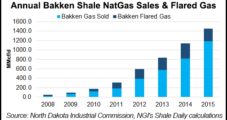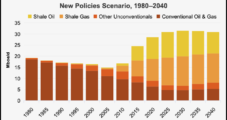The resilience of U.S. unconventional natural gas and oil from shale and tight resources has cemented the country’s position as the biggest producer in the world, even at lower prices, the International Energy Agency (IEA) said Tuesday.
Tag / Researchers
SubscribeResearchers
Articles from Researchers
Strategic Shale Gas Infrastructure Placement May Reduce Environmental Impacts, For A Price
The strategic placement of shale gas infrastructure could reduce environment impacts for a reasonable additional cost, but doing so would require commitments from planners and regulators and would be a departure from current practices, according to researchers.

Bakken Blamed for Rise in Global Ethane Emissions
The increase in global ethane emissions is the result of increased oil and natural gas activity in the Bakken Shale, according to University of Michigan (U-M) researchers.

Bakken Blamed for Rise in Global Ethane Emissions
The increase in global ethane emissions is the result of increased oil and natural gas activity in the Bakken Shale, according to University of Michigan (U-M) researchers.
Dartmouth Research Sees Major Employment Gains From Shale Development
Backing claims of the economic benefits of shale drilling, a recent study conducted by Dartmouth College researchers concluded that unconventional oil and gas development has paid dividends for the surrounding regions.
Big Four Shale Gas Plays Show Decline — Not Plateau — After 2020, Say University of Texas Researchers
The U.S. Energy Information Administration (EIA) and a bevy of independent analysts have predicted domestic natural gas production will climb rapidly over the long-term because of booming unconventional gas growth. However, the University of Texas at Austin (UT) is predicting production from the biggest shale gas plays — Marcellus, Barnett, Fayetteville and Haynesville — will peak by 2020 and decline thereafter.
California Giving Away Water It Doesn’t Have, Researchers Say
California’s state-run water rights allocation system has given away five times more in volumes than the average annual surface water supplies available through natural runoff, according to California researchers.
Study Finds Methane Emissions 50% Higher Than EPA Estimates
A review of 20 years of technical literature on natural gas emissions in the United States and Canada found that methane (CH4) emissions appear significantly larger than official estimates, but they are not enough to negate the benefits of switching from coal power generation to natural gas-fired power.
Duke Researchers Issue Another Controversial Report
Researchers from Duke University published another controversial study on Wednesday, this time taking aim at a wastewater treatment plant in western Pennsylvania after finding radioactive chemicals in an adjacent creek bed, and blaming the find on Marcellus Shale development.
Study Finds Ambient Air in Barnett Shale to Be Safe
Shale gas production activities in the Barnett Shale have not resulted in volatile organic compound (VOC) exposures great enough to pose a health concern for area residents, according to a new study of the region’s air quality.





